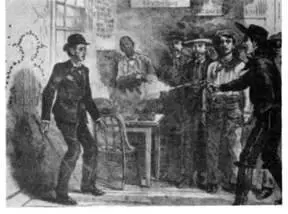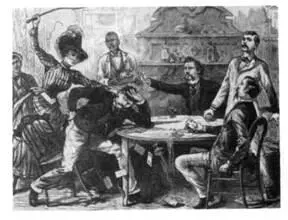Ishmael Reed - Mumbo Jumbo
Здесь есть возможность читать онлайн «Ishmael Reed - Mumbo Jumbo» весь текст электронной книги совершенно бесплатно (целиком полную версию без сокращений). В некоторых случаях можно слушать аудио, скачать через торрент в формате fb2 и присутствует краткое содержание. Год выпуска: 2013, ISBN: 2013, Издательство: Open Road Media, Жанр: Современная проза, на английском языке. Описание произведения, (предисловие) а так же отзывы посетителей доступны на портале библиотеки ЛибКат.
- Название:Mumbo Jumbo
- Автор:
- Издательство:Open Road Media
- Жанр:
- Год:2013
- ISBN:9780684824772
- Рейтинг книги:5 / 5. Голосов: 1
-
Избранное:Добавить в избранное
- Отзывы:
-
Ваша оценка:
- 100
- 1
- 2
- 3
- 4
- 5
Mumbo Jumbo: краткое содержание, описание и аннотация
Предлагаем к чтению аннотацию, описание, краткое содержание или предисловие (зависит от того, что написал сам автор книги «Mumbo Jumbo»). Если вы не нашли необходимую информацию о книге — напишите в комментариях, мы постараемся отыскать её.
Mumbo Jumbo
Mumbo Jumbo
Mumbo Jumbo — читать онлайн бесплатно полную книгу (весь текст) целиком
Ниже представлен текст книги, разбитый по страницам. Система сохранения места последней прочитанной страницы, позволяет с удобством читать онлайн бесплатно книгу «Mumbo Jumbo», без необходимости каждый раз заново искать на чём Вы остановились. Поставьте закладку, и сможете в любой момент перейти на страницу, на которой закончили чтение.
Интервал:
Закладка:
I didn’t think you wanted to listen to my talk.
Pop, I have 2 tickets to a play at the Lafayette Theatre. Would you like to go? The curtain is in a ½ hour.
Love to, if you don’t mind going with an old man.
O pop, don’t give me that, pop, you’re only as old as you feel.
The couple heads toward the theater a few blocks away. Soon they see the title of the new play, a play about the future.
Mumbo Jumbo Holiday
PaPa LaBas remembers that Black Herman had praised it but the Atonist critics had criticized it as a lot of Bull. Well at any rate, it seemed to be packing them in.
Epilogue
In the year 1909 “…it began as a flair-up. Localized in a few places, the South, the West and the Northeast. It knew neither class, race nor consciousness.” An Atonist, whose cover was editorial writer for the Musical Courier, wrote in 1899:
Society has decreed that ragtime and cakewalking are the thing, and one reads with amazement and disgust of historical and aristocratic names joining in this sex dance, a milder edition of African orgies.
Cakewalking and ragtime are symptoms of that X factor. The stumper of Psychic Epidemiologists. It was 11 years before Hinckle Von Vampton’s message, to those in the know, that Sigmund Freud was dispatched to America for the purpose of diagnosing this phenomenon. (Sigmund Freud as you will recall is the man who grew up in a town dominated by the 200-foot steeple belonging to a church named for the Virgin Mary. It affected him. He began to trace Man’s “neurosis” to situations arising from this elemental relationship. The Mother and Son! [How many times do you hear of Electra?]
Freud, whose real talent lies in the coinage of new terms for processes as old as the Ark. He is as gifted as an American soap canvasser at this. This is why perhaps he was better known here than in his own Vienna.
Freud drinks from a Dixie Cup as the party sails into New York harbor. He stands in awe before Niagara Falls. He then pushes into the hinterland of the American soul and here in this astral Bear country he sees the festering packing Germ.
Freud faints. What he saw must have been unsettling to this man accustomed to the gay Waltzing circles of Austria, the respectable clean-cut family, the protocol, the formalities of “civilization.” Smelling salts are administered to their teacher by followers who’ve not seen such an outburst since their teacher waxed all “paranoid” when someone awarded him a medal upon which was etched the Sphinx being questioned by the traveler. Or on another occasion when Carl Jung confronted him with the fable of the fossilized corpses of peat moss.
What did this man see? What did this clear-headed, rational, “prudish” and “chaste” man see? “The Black Tide of Mud,” he was to call it. “We must make a dogma… an unshakable bulwark against the Black Tide of Mud,” uttered this man who as a child returned from church and imitated the minister and repeated his sermons in a “self-righteous manner.”
A tall, bespectacled man summons a news conference.
Q. What did the Doctor mean by “The Black Tide of Mud?”
A. He meant occultism.
Q. Why, then, did he employ the language of the Churchman: “Dogma”?
A. It was merely a figure of speech.
Q. But according to his theories, don’t figures of speech have latent significance?
…Please, Dr. Jung pleads. No more questions. I must return to the Doctor.
1 reporter insists on 1 more question.
Q. Before you leave, Doctor, can you give us Dr. Freud’s impressions of America?
A. He considers it “a big mistake.”
Freud, who disliked prophecy, was in no position to make a diagnosis. He admitted once that he could not discover “this ‘oceanic’ feeling in myself.” Lacking harmony with the world, he was unable to see what it was.
Later Jung travels to Buffalo New York and at a dinner table discovers what Freud saw. Europeans living in America have undergone a transformation. Jung calls this process “going Black.”* This chilly Swiss keeps it to himself however.
Strange. It seems that the most insightful pictures of America are done by Europeans or Blacks. Myrdal, Tocqueville, Jung, Trollope, Hernton, Clarence Major, Al Young, or Blacks who know both Europe and America: Wright, Baldwin, Chester Himes, John A. Williams, William Gardner Smith, Cecil Brown. I once leafed through a photo book about the West. I was struck by how the Whites figured in the center of the photos and drawings while Blacks were centrifugally distant. The center was usually violent: gunfighting lynching murdering torturing. The Blacks were usually, if it were an interior, standing in the doorway. Digging the center.


The clock on the wall strikes 10:00 P.M. The lecture should have concluded an hour before. But when PaPa LaBas gets started he doesn’t stop. He’s a Ghede. Garrulous gluttonous satirical sardonic but unafraid to march up to the President’s Palace and demand tribute.
What did Freud mean by The Black Tide of Mud? Why were there later to be assassinations of cultural heroes? In 1914 Scott Joplin, who, after announcing that ragtime will “hypnotize this Nation,” is taken to Ward Island where they fritter away his powers with shock therapy. Scott Joplin has healed many with his ability to summon this X factor, the Thing that Freud saw, the indefinable quality that James Weldon Johnson called “Jes Grew.”
“It belonged to nobody,” Johnson said. “Its words were unprintable but its tune irresistible.” Jes Grew, the Something or Other that led Charlie Parker to scale the Everests of the Chord. Riff fly skid dip soar and gave his Alto Godspeed. Jes Grew that touched John Coltrane’s Tenor; that tinged the voice of Otis Redding and compelled Black Herman to write a dictionary to Dreams that Freud would have envied. Jes Grew was the manic in the artist who would rather do glossolalia than be “neat clean or lucid.” Jes Grew, the despised enemy of the Atonist Path, those Left-Handed practitioners of the Petro Loa, those too taut to spring from sharp edges, wiggle jiggle go all the way down and come up shaking. Jes Grew is the lost liturgy seeking its litany. Its words, chants held in bondage by the mysterious Order “which saved the 2nd Crusade from annihilation by Islamic hordes.” Those disgraced Knights. Jes Grew needed its words to tell its carriers what it was up to. Jes Grew was an influence which sought its text, and whenever it thought it knew the location of its words and Labanotations it headed in that direction. There had been a sporadic episode in the 1890s and it was driven back into its Cell. Jes Grew was jumpy now because it was 1920 and something was going on. A Stirring. If it could not find its Text then it would be mistaken for entertainment. Its basic dances were said to have been recorded by the secretary to the first Seedy Fellow himself.
Jes Grew was going around in circles until the 1920s when it impregnated America’s “hysteria.” I was there, a private eye practicing in my Neo-HooDoo therapy center named by my critics Mumbo Jumbo Kathedral because I awarded the Asson to myself. Licensed myself. I was a jacklegged detective of the metaphysical who was on the case; and in 1920 there was a crucial case. In 1920 Jes Grew swept through this country and whether they liked it or not Americans were confronted with the choices of whether to Eagle Rock or Buzzard Swoop, whether to join the contagion or quarantine it, whether to go with Jes Grew or remain loyal to the Atonist Path protected by the Wallflower Order, its administrative backbone, composed of grumblers and sourpusses to whom no 1 ever asked:
Читать дальшеИнтервал:
Закладка:
Похожие книги на «Mumbo Jumbo»
Представляем Вашему вниманию похожие книги на «Mumbo Jumbo» списком для выбора. Мы отобрали схожую по названию и смыслу литературу в надежде предоставить читателям больше вариантов отыскать новые, интересные, ещё непрочитанные произведения.
Обсуждение, отзывы о книге «Mumbo Jumbo» и просто собственные мнения читателей. Оставьте ваши комментарии, напишите, что Вы думаете о произведении, его смысле или главных героях. Укажите что конкретно понравилось, а что нет, и почему Вы так считаете.












